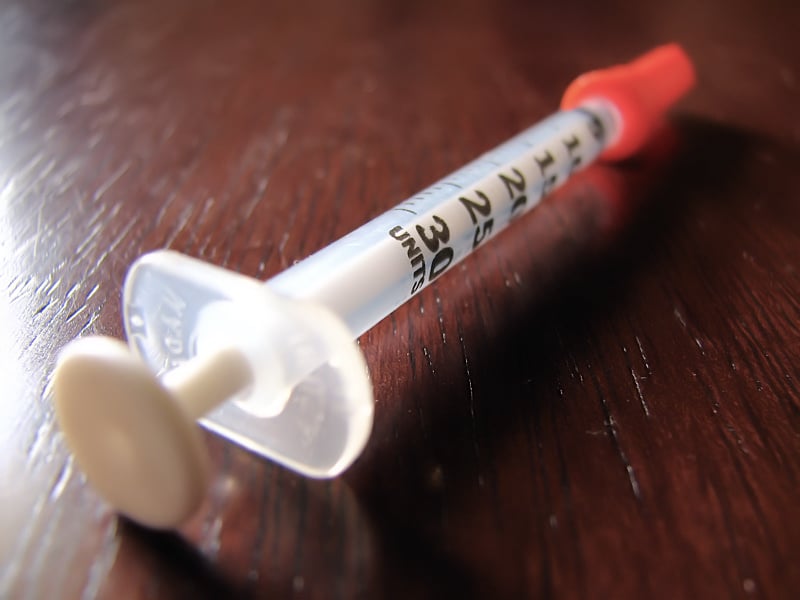In West Virginia, which has the highest rate of opioid-involved overdose deaths in the US, injecting drugs with shared needles is leading to increasing HIV and hepatitis C diagnoses. According to the Centers for Disease Control and Prevention (CDC), West Virginia has the highest rate of hepatitis C infections of any state, with reported infections increasing 75 percent between 2013 and 2017. And evidence suggests that the situation could get far worse.
Yet state-level politicians are proposing legislation that could rid the state of evidence-based interventions to protect drug users’ health. On January 10, Senator Eric Tarr (R) introduced Senate Bill 286, which would completely ban syringe exchanges. If the bill passes, any exchange will have to immediately close shop or pay a $25,000 fine. The North American Syringe Exchange Network currently lists 12 syringe programs operating in the state.
Syringe exchange “has become a public hazard and the fact of the matter is that we shouldn’t be creating more of a public hazard around addiction,” Tarr told WSAZ this month. “The effort was valiant and I understand that, but it’s a failed experiment and it needs to go away.”
Tarr’s comments contradict decades of scientific evidence showing that syringe service programs reduce HIV and other diseases.
In Cabell County, on the state’s western edge bordering Kentucky and Ohio, reported HIV infections surged in early 2018. There were 80 cases between January 2018 and September 2019, in a county that formerly saw between five to eight cases each year. This was a larger increase in one year than in the entire state since 2008. In March 2019, the West Virginia Bureau for Public Health declared Cabell County an “HIV cluster”—the first in the state to be identified as related to injection drug use.
There is good cause to fear that other counties will follow. The Centers for Disease Control and Prevention (CDC) has placed half of West Virginia’s 55 counties on its list of 220 US counties at risk of HIV outbreaks from injection drug use.
In 2015, Cabell County became the first in the state to pilot a syringe exchange program; since then, it has provided additional harm reduction services like disease testing, substance use disorder treatment and HIV-prevention PrEP medication. The county, which suffered an overdose death rate eight times the national average in 2017, has seen a 25 percent reduction since. It is likely that without these preventative measures, Cabell County would be suffering even more HIV infections.
But despite Cabell County having been a regional leader in various aspects of harm reduction, it is not immune from political pressure and stigma against people who use drugs. In July 2018, the county health department restricted the syringe exchange program to county residents only. This was in response to a police report arguing that violent crime in the neighborhood had increased since the center opened.
The new restrictions dramatically decreased the amount of syringes dispensed—from 62,000 a month to 18,600 after July 2018. According to health officials, this was the time when new HIV cases started increasing. However, in October 2019, the county received a $127,500 grant for its harm reduction program and to combat hepatitis C infection. The funding came from HepConnect, which gave out $920,000 in such grants throughout West Virginia.
While Cabell County’s harm reduction efforts have mostly weathered stigma, this has not been the case in other areas. Charleston, West Virginia’s capital and largest city, shut down a syringe exchange in May 2018.
It had opened in December 2015, the same year as Cabell County’s. But a public backlash emerged during the Kanawha-Charleston Harm Reduction Clinic’s 29 months of operation. Police, firefighters and residents complained about syringe litter in public spaces, and then-Mayor Danny Jones called the program a “needle mill” and a “mini mall for junkies”.
The program was successful in distributing many sterile syringes—though not 12,000 a day, as Jones claimed. On average it gave out 5,000 syringes to 190 visitors, or roughly 26 syringes per person per week. The state suspended the program after claiming it failed an evaluation, then revoked its certification. Kanawha County reported 17 cases of HIV in 2018, and almost as many in 2019.
Filter reported on activists’ 2019 journey to Charleston to push back against widespread obstacles to harm reduction.
Over 100 miles to the northeast, in Harrison County, officials also responded to political pressure by shutting down a syringe exchange program last year. The Harrison-Clarksburg Health Department had, since May 2017, provided sterile syringes and other harm reduction services at its center in Clarksburg, the county seat. But in September 2019, the city council passed new ordinances that effectively restricted the program’s operations by mandating that participants be tested for blood-borne disease before receiving any syringes.
The Harrison County Board of Health argued that the city’s policy violated both state law and federal CDC guidelines, which state that “HIV testing must be voluntary and free from coercion.” The board said that it could not continue offering syringes and also comply with the city ordinance.
Hepatitis C infections have been rising in Harrison County, with 42 positives in 2019. More promising news is that more people in Harrison County are now getting tested for diseases, despite the closure of its syringe exchange. The county also found no positive HIV cases between 2017-2019, though state data shows five cases identified there.
But in Harrison County and many others in West Virginia, the situation could rapidly deteriorate. Inaction could be devastating enough. But banning syringe exchanges, the evidence shows, is likely to lead to far more disease and death.
Image by Melissa Johnson via Flickr.




